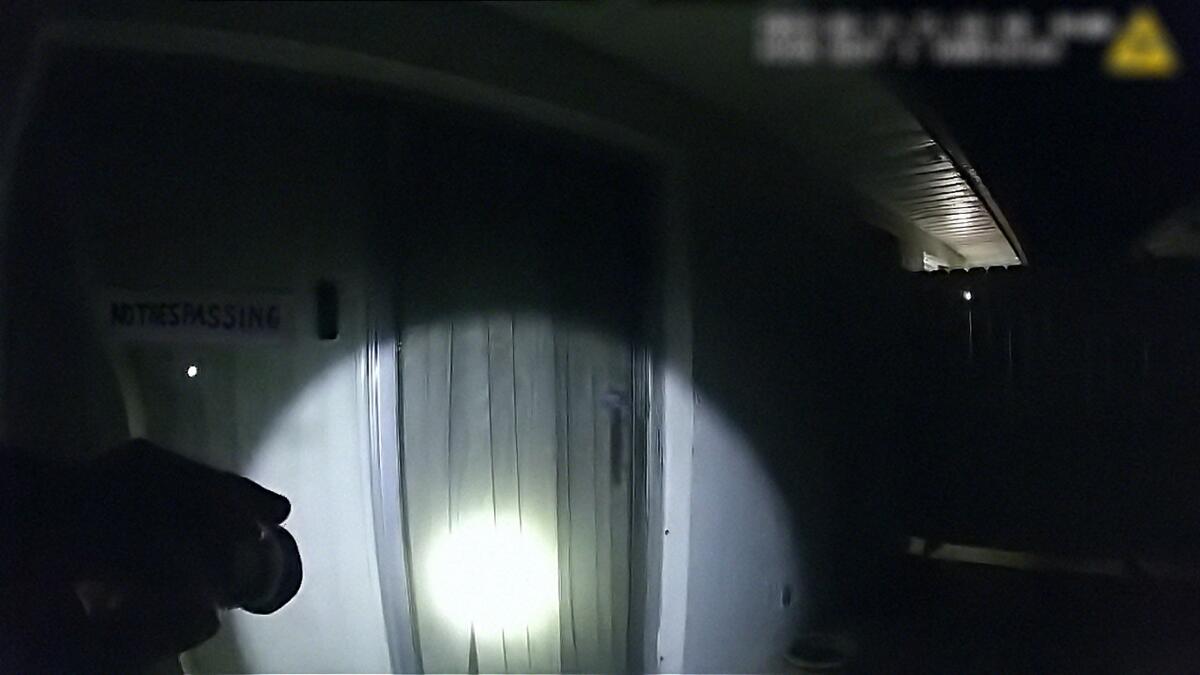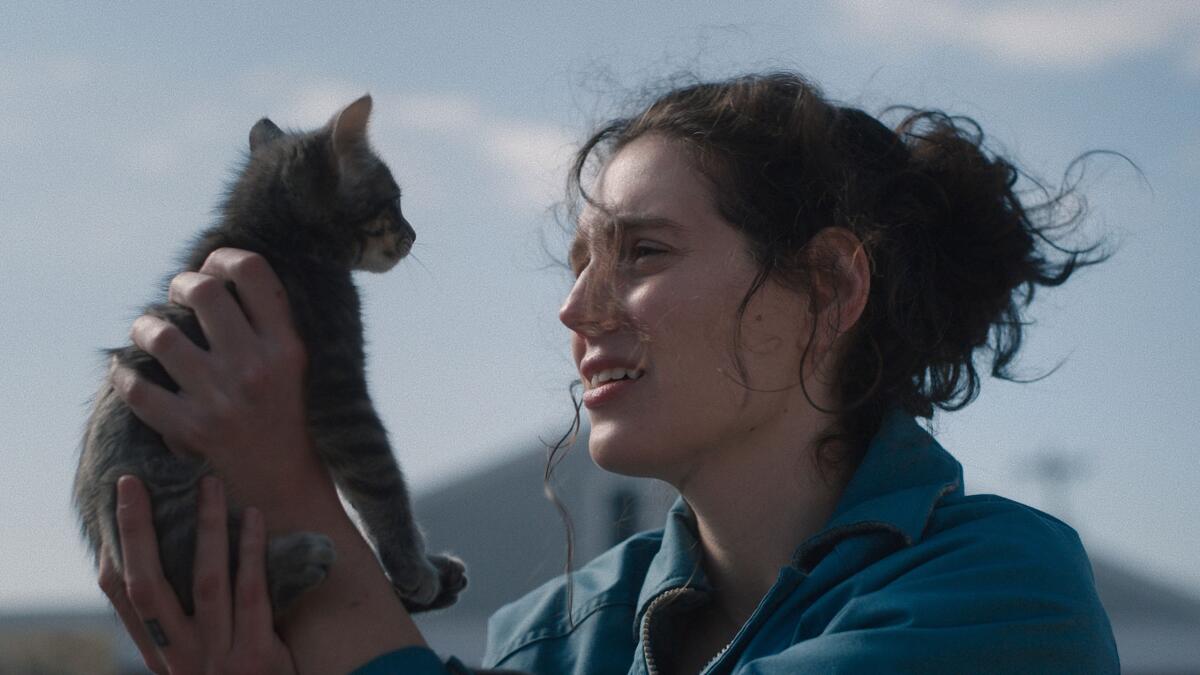How is this for whiplash? Fresh off a hot batch of Oscar nominations, we now turn to the week’s other big news, a new edition of the Sundance Film Festival, where independent cinema will make its stand for yet another year. As always, The Times will be in Park City, Utah, for all the buzz and world premieres — check back daily for reviews, news, video interviews and more. Evenings of single-digit temperatures await us, as do, we hope, a number of discoveries. For now, here are the titles that beguile us going in.
‘By Design’
Samantha Mathis, Juliette Lewis and Robin Tunney in the movie “By Design.”
(Patrick Meade Jones / Sundance Institute)
Juliette Lewis has played murderers, drifters, alcoholics, punk rockers, Reiki healers and roller-derby captains. Now, she plays a chair. (Yes literally, with wood and four legs.) “By Design,” by the playwright-turned-filmmaker Amanda Kramer, has one of this Sundance’s more mysterious hooks: What happens when a woman realizes that society prefers her inanimate? Kramer’s first two films, “Ladyworld” and “Please Baby Please,” introduced her as an arch stylist with bold ideas and an insouciant disregard for telling stories that play by the rules — if she were a chair, she’d wear a slipcover of sharp crystals. Clearly, audiences will have to check their commitment to reality at the door. Even within a cast that includes Melanie Griffith, Samantha Mathis and Udo Kier, I’m most curious to see Mamoudou Athie play a man who comes to possess (and sit) on Lewis’ seat. Athie is a performer of unusual conviction — and this unusual film is going to take everything he’s got. — Amy Nicholson
‘The Dating Game’

A still from the documentary “The Dating Game.”
(Wei Gao / Sundance Institute)
Much ado has been made over the lopsided mating pool of China, where the recent census showed a surplus of 30 million single men. With women scarce, the competition is steep — think “The Bachelorette” on steroids. Enter Hao, a dating guru who believes that being yourself is a myth. He runs a seven-day boot camp that remakes lonely guys both outside and in, including flashy shirts and haircuts to what he calls “strategic deception.” Hao’s own lovely wife, Wen, is a testament to his pickup skills. But the couple is still at odds. Wen not only disagrees with his instructional methods, she has her own coaching business that advises women to love themselves first. This documentary by Violet Du Feng studies the battle between the sexes on a scale that’s both intimate and grandly sociological. She’s pointed her camera at Chongqing, but she’s captured an empathetic universe of insecurity, flirtation and, hopefully, love. — Amy Nicholson
‘It’s Never Over, Jeff Buckley’

Jeff Buckley in the documentary “It’s Never Over, Jeff Buckley.”
(Merri Cyr / Sundance Institute)
Like so many, I discovered the beauty of Jeff Buckley’s music years after he drowned in the Mississippi River in 1997. There was a period when his lone studio album “Grace” was a constant in my three-disc changer, listening nightly as I drifted off to sleep. Even now, I revisit it often, 31 years after its release, because it remains a haunting and near-perfect album, and one that I count among the best of the last 50 years. Naturally, I am eager to see what Oscar-nominated documentarian Amy Berg (“Deliver Us From Evil,” “Janis: Little Girl Blue”) has unearthed for the film, the title of which references the lyrics of Buckley’s “Lover, You Should Have Come Over.” Berg convinced Buckley’s mother, Mary Guibert, to give her access to the artist’s archive. The documentary promises rare performances and “Buckley’s own diaristic narration,” according to the festival’s programming notes. It’s also a chance to introduce a new audience to an incredible artist, one who should be better known beyond his cover of Leonard Cohen’s “Hallelujah.” — Vanessa Franko
‘Lurker’

Archie Madekwe, left, and Théodore Pellerin in the movie “Lurker.”
(Sundance Institute)
I’ve been waiting for the British actor Archie Madekwe (“Midsommar,” “Gran Turismo”) to become a big star. Here, at least, he plays one on the rise — a musician who might need to get a better handle on his entourage. Before the velvet ropes go up, the artist allows a dubious average Joe (Théodore Pellerin) into his inner circle. I’m not sure what happens next in this thriller, but I have a feeling that Madekwe, recently seen in “Saltburn” as a snide, posh snob undone by Barry Keoghan, might put up more of a fight this time. Debuting filmmaker Alex Russell has two major TV credits on his resume — “The Bear” and “Beef” — which he wrote on and produced. Awkward tension is definitely his thing. If Russell’s depiction of burgeoning pop stardom feels as visceral as his depictions of kitchens and road rage, this one’s gonna be a scorcher. — Amy Nicholson
‘The Perfect Neighbor’

A still from the documentary “The Perfect Neighbor.”
(Sundance Institute)
Many will likely remember aspects of the 2023 news story of how Ajike “AJ” Owens, a mother of four, was shot by her neighbor, Susan Lorincz, through a locked door following an escalating series of minor disputes. Directed by Geeta Gandbhir and premiering in the U.S. documentary competition, “The Perfect Neighbor,” recounts the build-up and aftermath of that startling incident in vivid, up-close detail. Told largely via the perspective of police body-cam video — the authorities were called to the otherwise quiet neighborhood so often that characters, story lines and subplots all clearly emerge — there is a genuine immediacy to the storytelling that reaches a devastating climax as the night of the shooting spirals into chaos and heartbreak. Lorincz was not initially charged with any crime because of Florida’s “stand your ground” self-defense law before later being brought to trial, as the film shifts to examine how a single act of violence can irrevocably change so many lives. — Mark Olsen
‘Serious People’

Miguel Huerta, left, and Pasqual Gutierrez in the movie “Serious People.”
(Pasqual Gutierrez and Ben Mullin / Sundance Institute)
The festival’s NEXT section is home to films that are too offbeat, too unconventional, just too plain weird to fit into other sections of the Sundance program. Directed by Pasqual Gutierrez and Ben Mullinkosson, “Serious People” is an exemplar of that ethos as its oddball charms unfurl. Pasqual, a music video director played by Gutierrez, wants to spend more time with his pregnant partner, so he hires a lookalike to take his place at work. The plan is for his double to unobtrusively play along during Zoom calls and production meetings, but the guy he hires turns out to be an unpredictable live-wire, prone to utterly impractical ideas and deeply inappropriate workplace behavior. Wildly funny, the film also has a tender side as it explores the need for a work-life balance even in creative fields that also require a commitment of passion. — Mark Olsen
‘Sorry, Baby’

Eva Victor in the movie “Sorry, Baby.”
(Mia Cioffi Henry / Sundance Institute)
The debut feature from director-writer-star Eva Victor, “Sorry, Baby” is also a compact primer on why Sundance still matters. Serving as an introduction to an engaging new artistic voice, the film captures a certain laconic, free-floating malaise and anxiety that are indicative of an emergent generational sensibility. Told in an elliptical style with novelistic chapters, the story follows Agnes, a literature grad student turned junior professor at a small liberal arts college who is struggling to move forward from a traumatic event. Victor’s performance is touched by grace and whimsy while also pulling off dramatic emotional moments, sometimes within the same scene. With key supporting turns from Naomi Ackie, Lucas Hedges and John Carroll Lynch, the film is the sort of bold, inventive storytelling along with a discovery of fresh talent that is exactly what one wants out of the festival. — Mark Olsen
‘Zodiac Killer Project’

A still from the film “Zodiac Killer Project,” directed by Charlie Shackleton.
(Sundance Institute)
Given all the high-profile movies and series TV spun out from this still-unsolved criminal case, you’d think the actual Zodiac killer would have emerged by now, just to get a taste of the royalties. Of course, as any bleary-eyed obsessive knows, the real guy is most likely dead at this point, but don’t call filmmaker Charlie Shackleton late to the game. His humorous, bone-dry documentary gets at more than most, first by being a meta-confessional about how his own efforts to make a conventional movie failed. (He was denied the option rights to a book.) No matter: The film that he has made is revenge on an entire genre, detailing all the clichés that go into seemingly every true-crime project, including atmospheric, faceless re-creations and those gauzy title sequences that manage to both say everything and nothing. Narrated in his own witty British voice, Shackleton’s latest provocation joins prior titles “Beyond Clueless” and “Paint Drying” as an enjoyably self-deprecating study that takes aim at a mode of storytelling that could benefit from a little danger. — Joshua Rothkopf


